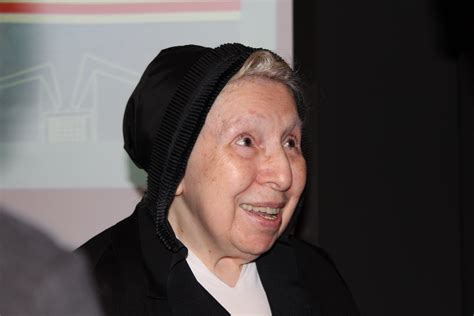
Sr. Margherita Marchione, an American nun known for her defense of Pope Pius XII (Pope from 1939 to 1958) against attacks against his character, courage and actions during the Second World War (1939-1945), died on May 19, 2021, at the age of 99. (link)
After her death, the New York Times published an obituary which contained an imprecision on an important point, regarding the war-time action of Pius XII and a display on the matter shown at the Yad Vashem museum on the holocaust in Jerusalem, Israel.
William Doino, Jr., an American who is one of the leading scholars on the Pope’s actions during World War II (as well as being a close friend of Sr. Margherita, and a longtime contributor to Inside the Vatican magazine), noted the imprecision in the New York Times obituary on Sr. Marchione, and wrote a letter to the Times asking for a clarification to be published.
The Times has now published that clarification, which is to the paper’s credit. (see below)
***
The essential issue is whether Pius XII was a coward and ineffective in facing the terrific persecution of the Jews during World War II — an impression given at the Yad Vashem museum, which spoke of the “silence” of Pius in the face of the persecution.
***
Through many years of careful research, Sr. Margherita showed that Pius XII, while seemingly “silent,” was in fact acting in a decisive way to open the convents and monasteries of Rome, and elsewhere in Italy, so that many thousands of Italian Jews could find refuge in 1943 and 1944, and not be deported to concentration camps.
***
Sr. Margherita’s research is increasingly being accepted, also by many Jews, as of decisive importance in showing the true character of Pius XII. Sr. Margherita must be seen today as a key figure in the “Pius Wars,” the wars between scholars who write the history of that period, and she should be known for that, and honored for that.
American sisters in particular ought to know of the great efforts Sr. Margherita made in this regard, efforts that were always courageous, and often required her to go forward almost alone. This displayed great virtue, and this should be known.
***
And, the correction made by the New York Times now becomes part of this remarkable story — a story that suggests that she acted on many occasions with the heroic virtue of a saint.
Again, farewell to Sr. Margherita, to whom the Church owes a great deal, but also to whom those who are interested in historical truth also owe a great debt of gratitude.
And thanks also to the New York Times, for its willingness to correct an imprecision in this matter. —RM
Here is William Doino’s account of this story:
Dear Friends,
Some encouraging news on the history front!
I am pleased to report that, after I wrote my respectful but pointed letter to the New York Times, noting that the paper’s recent obituary of Sr. Margherita Marchione, a powerful defender of Pius XII, contained a serious error about Yad Vashem’s position on Pius XII, the Times has now formally acknowledged, on its corrections page today, that they did indeed make the error — please note link below, and scroll down a bit to the “Obituaries” section:
https://www.nytimes.com/2021/06/01/pageoneplus/corrections-june-2-2021.html
Here is the text of the Times correction, followed by my brief comments: “An obituary on Monday about Sr. Margherita Marchione, known as ‘the fighting nun’ for her defense of Pope Pius XII against allegations that he had not done enough to save the Jews from Nazi atrocities during World War II, included an outdated reference to a display about Pius in a museum operated by Yad Vashem, the Memorial to victims of the Holocaust in Israel. A panel beneath a photo of him says that he “did not publicly protest” the deportation of the Jews from Rome. It no longer says that “he did not intervene” to try to stop the deportation: that language was revised in 2012.”
My comments: Yes, the language was revised, the point being that Pius XII DID intervene to rescue many Jews during the Nazi raid on Rome’s Jews, though he certainly wasn’t going to publicize that fact, at that hazardous moment, in a reckless or counterproductive way, as the eminent historian Owen Chadwick once observed, lest that trigger the Nazis to invade all the Catholic sanctuaries in Rome and seize all the Jews then being protected by the Pope and countless religious.
Further, that was not the only language revised in the caption: Yad Vashem’s new placard, while still noting the criticisms made against Pius, contrasts them by highlighting Pius XII’s famous 1942 Christmas address, in which he condemned mass murder based upon “nationality or race” — provoking the Nazis to brand him a “mouthpiece of the Jewish war criminals” but also inspiring Catholic rescuers to act, as they have testified in abundance — and documents how he “appealed separately to the leaders” of Nazi-occupied countries, and how the Pope’s principled and prudent wartime strategy, as his supporters maintain, was far more successful than anyone could have imagined, given the insanity and ferocity of the Third Reich, “thus enabling a considerable number of rescue activities to take place at different levels of the Church. Moreover, they point to cases in which the pontiff offered encouragement to activities in which Jews were rescued.”
Since Yad Vashem’s significant changes, a number of institutions, once hostile to Pius XII, have also acknowledged Pius XII’s life-saving actions during the Holocaust — notably the BBC (see, my commentary about that here) — and a number of high-profile historians who had previously criticized the wartime Pontiff, have followed suit (more soon about one such historian who recently made a stunning about-face, given what is emerging from the newly released Pius XII archives). For now, it’s welcome news enough that the most famous newspaper in the English-speaking world has corrected its error about Pius XII.
—Sincerely, WD
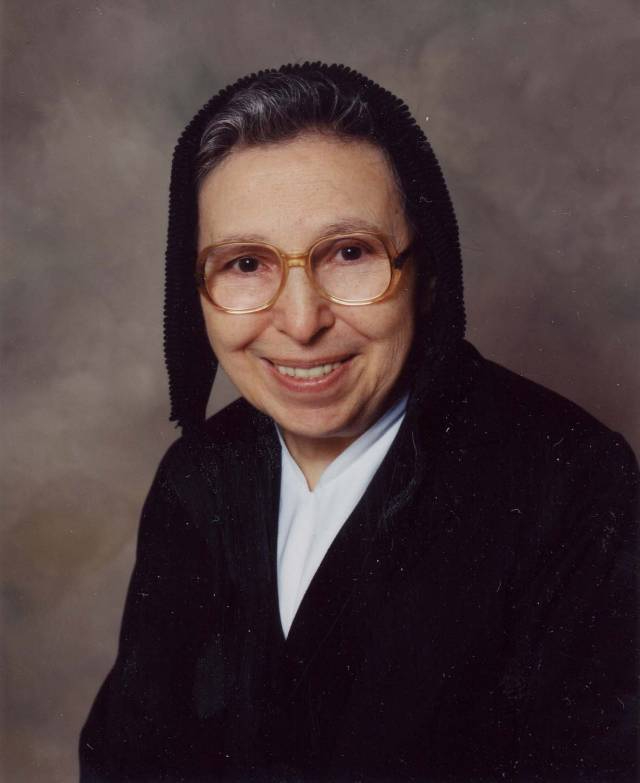
“If Jewish leaders say today that Pius XII did nothing to save Jews, they are disputing the testimony of other Jews who said he did quite a lot … It is terribly unfair to put so much blame on Pius, who had no army besides a few Swiss Guards with which to resist Hitler, while leaders like Franklin Roosevelt and Winston Churchill, who had the means to bomb the concentration camps, failed to do so.” —Sister Margherita Marchione
“Of course, I believe deeply in the righteousness of Pope Pius, but if you were to prove to me that Pius XII did something wrong, I would be the first to acknowledge it. Yet I haven’t found anything so far to indicate that… I know I won’t be around forever, but I very much hope to live long enough to witness the beatification of Pius XII. Until then, I will do what I can to bring that day closer by exposing the falsity of the attacks on this great and good man.” —Sister Margherita Marchione
Here is an article on this historical question (link):
How many Jews did Pius XII really help?
Even the historian Hubert Wolf admitted that Pius XII helped as many Jews as possible. In the background, a complex debate on the figure of Pope
By Andrea Gagliarducci
VATICAN CITY, May 17, 2021 / 10:00 AM (ACI Stampa) .-
How many requests for help from Jews were received by Pius XII during the Second World War? Johan Ickx, director of the historical archive of the “Relations with States” section of the Vatican’s Secretariat of State, counted 2,800 requests for help, relating to almost 5,000 people. But the German historian Hubert Wolf maintains the requests were even more numerous: about 15,000, while now arguing that Pacelli did really help the Jews whenever possible, in this way repositioning himself in the debate among historians, taking a softer position towards the Pope… (…)
Pinchas Lapide, former consul of Israel in Milan, went so far as to write that “The Catholic Church, under the pontificate of Pius XII, saved 700,000 Jews from certain death. According to some, even 860,000…”
Here is the corrected text (the part that is in bold) of the New York Times obituary:
Sister Margherita Marchione, Defender of Pius XII, Dies at 99
She spent decades arguing that the pope had helped the Jews during World War II, despite accusations that he had abdicated his moral responsibility.
Published May 29, 2021
Updated June 1, 2021
Sister Margherita Marchione, who became known as “the fighting nun” for her defense of Pope Pius XII against allegations that he had failed to do as much as he could have to save the Jews from Nazi atrocities during World War II, died on May 19 at her convent, Villa Walsh, in Morristown, N.J. She was 99.
Her death was confirmed by Sister Patricia Pompa, provincial superior of Sister Margherita’s order, the Religious Teachers Filippini.
The author of more than 45 books, Sister Margherita was the American-born daughter of Italian immigrants and spent nearly two decades teaching Italian language and literature at Fairleigh Dickinson University in Madison, N.J. She was the first nun to become a tenured professor at the university.
Early on, she delved into research on Philip Mazzei, a Florentine surgeon and horticulturalist who came to the United States in the 1700s, fought in the American Revolution and became friends with Thomas Jefferson.
She wrote seven volumes on Mazzei and amassed thousands of his papers, works of art and other items, which she donated to the Thomas Jefferson Foundation. And she campaigned successfully to get the United States Postal Service to issue a commemorative stamp in his honor in 1980.
But the work that dominated her later decades was her push for the beatification of Pope Pius XII, whose papacy lasted from 1939 until his death in 1958. Beatification is one step in the Vatican’s process of making someone a saint.
The pope’s record during the war has long been highly contentious, with many in the international Jewish community and others saying that he had remained shamefully silent and failed to use his moral authority to condemn the slaughter of Jews.
His defenders say he worked behind the scenes to encourage the Roman Catholic Church to save thousands of Jews and other victims of persecution.
History has yet to render a final judgment. Scholars have just begun to examine the pope’s immense archives, which consist of tens of thousands of papers and were fully opened only last year. Early reports bolstered accusations of Vatican indifference to Jewish suffering, but scholars said the complete picture would not be clear until all the papers could be studied, a process that has been slowed by the coronavirus pandemic.
Yad Vashem, the memorial in Israel to victims of the Holocaust, which also recognizes those who saved Jews from genocide, has been critical of Pius XII. In its museum, beneath a photograph of him, an initial statement said he “did not intervene” in the deportation of Jews from Rome. The language was softened in 2012, based on new research, to say he “did not publicly protest” their deportation. Last year, the museum urged caution in drawing any conclusions until the pope’s archives could be thoroughly examined.
Sister Margherita wrote several books arguing that, far from being passive, Pope Pius XII had allowed thousands of Jews to hide in Vatican institutions during World War II.
Sister Margherita was considered the pope’s foremost defender outside of the Vatican. She wrote several books arguing that, far from being passive, he had allowed thousands of Jews to hide in Vatican institutions during the war. She said that she had interviewed scores of them, and that they were grateful to him for saving their lives.
She received an award in 2003 from Pope John Paul II for her work “promoting the truth about Pope Pius XII.” In a speech acknowledging the award, she noted that her own order in Rome had sheltered 114 Jews in its convents, and that in gratitude they had presented one of those convents with a five-foot statue of the Madonna.
She also made numerous appeals to Yad Vashem to reconsider its characterization of the pope’s actions.
“If Jewish leaders say today that Pius XII did nothing to save Jews, they are disputing the testimony of other Jews who said he did quite a lot,” she told New Jersey Jewish News in 2007.
“It is terribly unfair,” Sister Margherita added, “to put so much blame on Pius, who had no army besides a few Swiss Guards with which to resist Hitler, while leaders like Franklin Roosevelt and Winston Churchill, who had the means to bomb the concentration camps, failed to do so.”
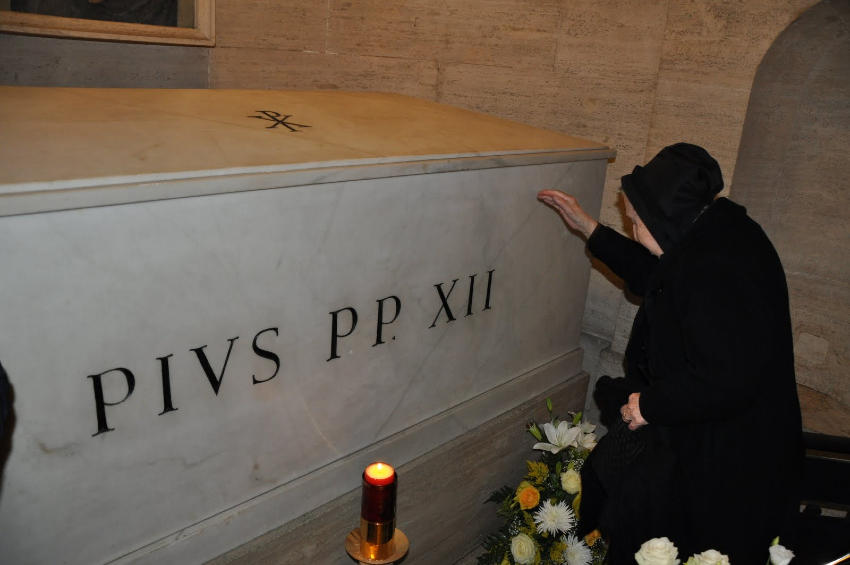

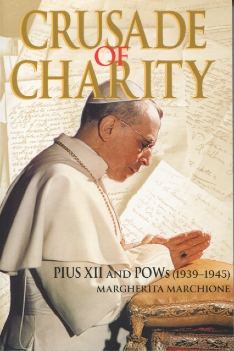
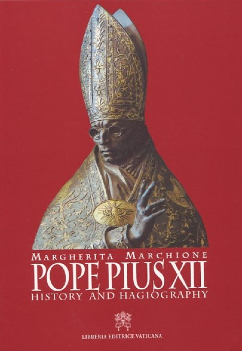
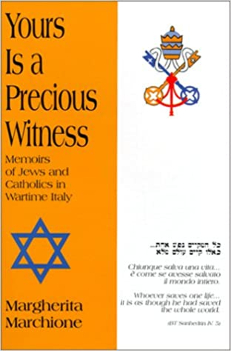





Facebook Comments